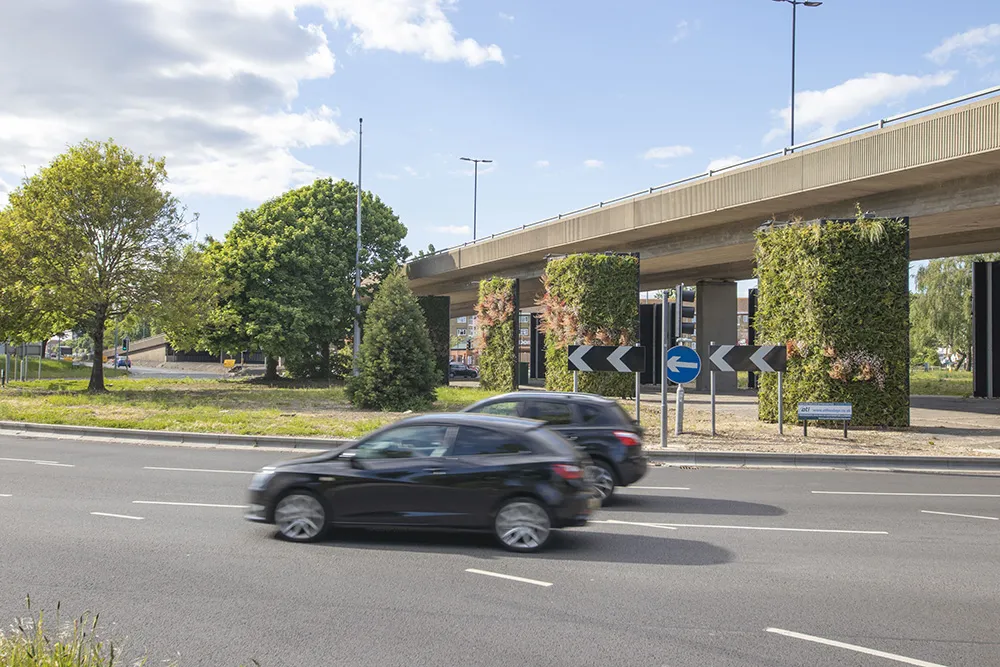
As air pollution continues to impact public health, there’s an increasing drive for local government and highway authorities to minimise roadside pollution caused by vehicles. Campaigning for public transport and investing in infrastructure are effective ways to offset air pollution. However, putting these solutions in place can be hindered through a lack of physical space and high implementation costs.
Often overlooked in the fight against air pollution are natural resources such as vegetation. These can provide an aesthetically pleasing, cost-effective and undisruptive solution to tackling the problem.
In response to a study on air quality, the English coastal city of Southampton devised a strategy to reduce air pollution. Biotecture worked closely with Southampton and Balfour Beatty’s Living Places – the contractor’s division that focuses on highway maintenance, street lighting and public space designs - to create the UK’s first highway living walls. Millbrook Flyover, one the city’s busiest roads, saw the installation of 10 of our freestanding living wall structures.
The city’s Millbrook Roundabout is a key entrance to the city and nearby container port; the city council was looking to find a solution that would be a welcoming feature on the roundabout while also mitigating air pollution. The wall’s intricate design features nearly 11,300 plants covering around 260m² and has improved both the appearance of the flyover and the quality of the air around it by offsetting pollution from the 36,000 vehicles that use the roundabout daily.
Our choice of species was informed by testing carried out by Imperial College London on a living wall we had previously installed. Each wall houses 17 species of carefully chosen plants, such as Euonymus (spindle or burning bush), Convolvulus cneorum (shrubby bindweed) and Acorus gramineus (grass-leaf sweet flag), all of which capture particulate matter. The selected plants were chosen for their surface density which allows them to better capture toxins, gases and pollutants – many of which are approximately 1/25th of the diameter of a human hair.
In addition to improving air quality for local residents and visitors, the living walls also benefit wildlife. The dense foliage attracts and provides refuge for bees, butterflies, ladybirds and lacewings that are essential for a well-balanced local ecosystem. Living walls also offer vital nesting space, shelter and food for birds and insects, increasing the biodiversity along highways.
A key part of the brief from the council was to mask the concrete support columns of the flyover. However, this had to be done in a way that was not fixed directly to the flyover, so as to allow for the concrete supports to be easily accessed for future structural inspections. In collaboration with Balfour Beatty structural engineering consultants, we designed a bespoke, arrowhead-shaped design on a freestanding steel frame upon which the living wall panels were mounted.
Each section of living wall is made up of two 2.2m-wide living walls attached at a 35 degree angle to form a shallow V-shape. The BioPanel living wall system is attached to the steel frame which is bolted to a reinforced concrete foundation. Each living wall is offset approximately 2.5m from the face of a column to avoid touching any part of the flyover’s infrastructure; this allows for maintenance inspections. If maintenance is required the living walls are simply unbolted from their base and temporarily re-located.
Despite the size and complexity of the project, the installation of the living wall was completed in only 15 days. This pioneering collaboration between Biotecture, Balfour Beatty and Southampton City Council is the first of its kind in the UK, setting a precedent for managing roadside pollution in other parts of the country. The project was awarded a prestigious National Gold Green Apple Award by The Green Organisation, a UK-based international environment group that recognises environmental best practice in both public and private sectors.
About the Author:
Richard Sabin is managing director of Biotecture, based in Chichester, England






